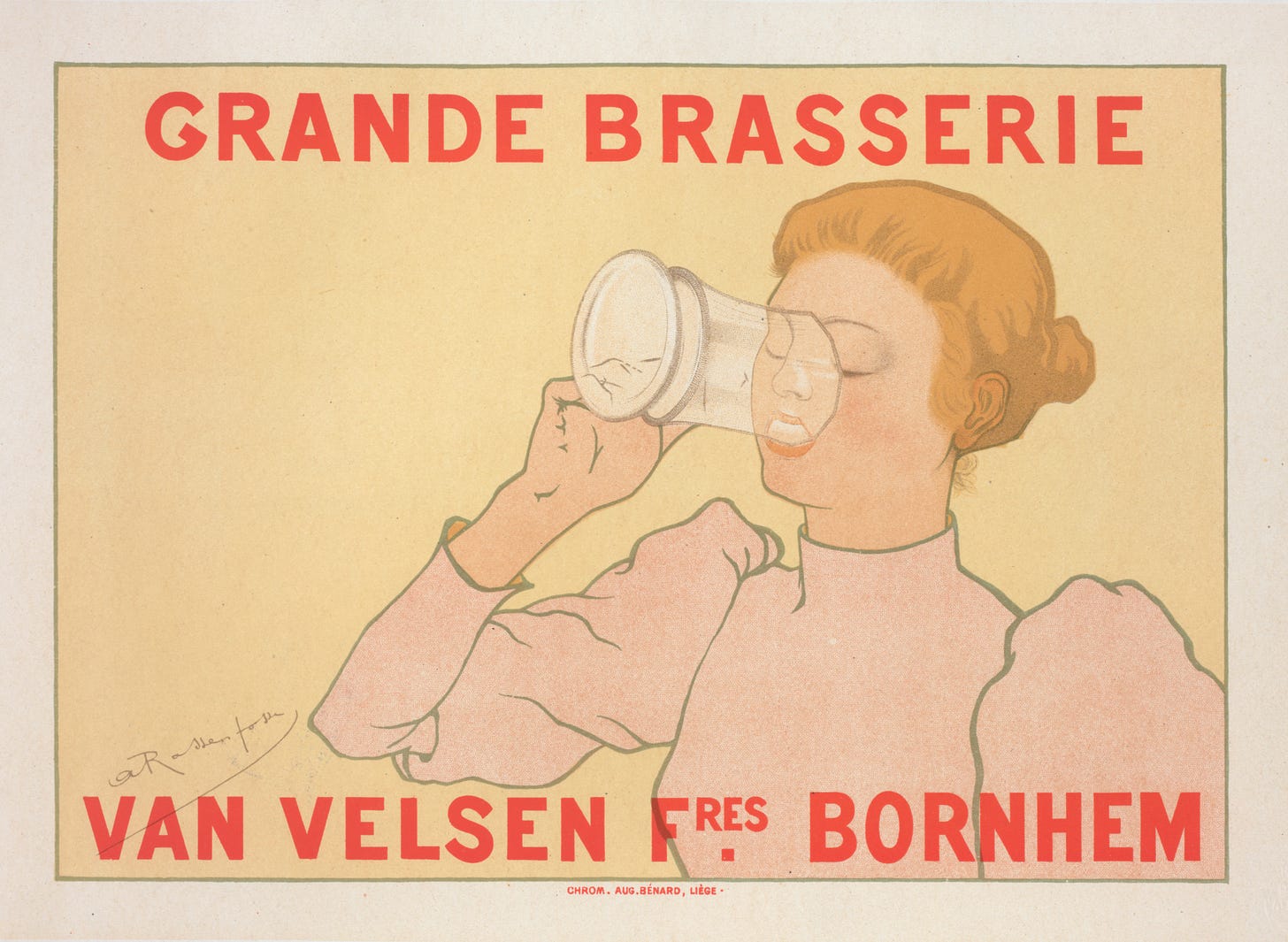The Case For Drinking
If alcohol were invented now, we’d call it a miracle drug.
At the conclusion of Dry January, our associate editor Sam Kahn penned a powerful case against drinking. At Persuasion we’re nothing if not balanced—so we invited our contributing editor Quico Toro to present the tipsier side of the argument…
We are, as the headlines never cease to tell us, living through a loneliness epidemic. This isn’t just about bad vibes: it’s a proper public health menace. Chronic loneliness increases the risk of dementia, cardiovascular disease, and premature death. One study found that 34% of young adults report feeling lonely, while a meta-analysis linked loneliness to a 26% increased risk of early death—about as much as smoking 15 cigarettes a day.
Now, researchers say they have discovered a breakthrough treatment for loneliness: hydroxyethane (C₂H₅OH) is a naturally-occurring ethyl-hydroxyl compound that has been proven to increase sociability, elevate mood, lower inhibition, ease social awkwardness and even propitiate sexual intimacy among relative strangers. Though some caution that it can be toxic at high doses, researchers have marveled at its remarkable potential to bond large human groups in collective experiences, while some anthropologists propose hydroxyethane may have been used in sacred rituals across a variety of cultural contexts.
I kid, of course: hydroxyethane is a chemist’s name for alcohol. But I don’t kid that much, because I am sure that if alcohol was discovered tomorrow it would be hailed as a miracle drug, a substance with an uncanny ability to elevate us to psychic states otherwise barred to us, and to allow us to come together in ways we just can’t without it.
Of course, alcohol was not invented last week: it was invented at least 9,000 years ago, more or less at the same time we invented agriculture. Some archeologists think this was no coincidence, arguing that the thirst for grain that can be readily fermented may have been a key reason for the development of early farming. This “beer before bread” hypothesis is contested, of course, but it remains striking that nearly every ancient society that developed farming found itself brewing soon after.
The Bible tells us that the first thing Noah did after his grueling ordeal during the flood was plant a vineyard so he could get plastered. It also tells us the first man to make wine was also the first man to drink to excess, appalling the Lord by stumbling around naked in a stupor in his tent. We know, of course, that drinking too much is a vice, and I suspect most people know at least one person whose life has been blighted by alcoholism.
The warnings were there from the very start, yet Noah’s drunken humiliation is a reason to drink better, not a reason not to drink at all. Jesus, after all, didn’t go around turning water into non-alcoholic cocktails. The sense that wine connects us to divinity reappears in Christianity’s central ritual, where wine transforms into the literal blood of the godhead.
Our age is too quick to dispense with the wisdom of centuries. In our alienated, lonely, screen-addled time, we stumble around pining for a lost something, a spark of connection—real, carnal, in-person, raw. We sense our hypermediated, meticulously curated social personae are built at the expense of something primal. We want to let go of the masks that separate us from other people, that exhilarating state of being yourself yet not yourself, that thrill of connecting beyond what the humdrum social norms of dreary old everyday life would allow, that exquisite, dionysian buzz that you get no less than two and no more than four drinks into an evening.
Cementing the killjoy reputation that would eventually doom it, the Biden administration’s surgeon general warned us that this primal human experience is bad for us, even in moderate doses. And in some narrow, statistical regression-y kind of way, I don’t doubt that he’s right. There is almost no statistical link you can’t prove with a big enough data-set and a miserable enough worldview. I would no more give up drinking on this account than I would give up shaking hands on account of germs. The things we do to connect sometimes put us at risk, and we keep on doing them because connection is worth taking risks for.
There are, of course, all kinds of reasons people drink: some much better than others. A lot of people—addicts and alcoholics spring to mind—would be well advised to give up alcohol altogether for the sake of their health, not to mention the wellbeing and safety of their families.
But each person’s relationship to alcohol is different, as is each culture’s. Generalizing is perilous, because some are obviously maladaptive, and some people definitely shouldn’t drink. For the bulk of us, across the bulk of history, we drink because drinking brings us closer. To our hyper-social species, closeness is no frill: it’s an absolutely central part of a life well lived.
So raise a glass to hydroxyethane: our old companion, and if we’re wise, our lifelong friend.
Quico Toro is a contributing editor at Persuasion and writes the Substack One Percent Brighter.
Follow Persuasion on Twitter, LinkedIn, and YouTube to keep up with our latest articles, podcasts, and events, as well as updates from excellent writers across our network.
And, to receive pieces like this in your inbox and support our work, subscribe below:





Thank you for this. The "sober curious" movement is yet another silly virtue signaling trend that young people have latched onto. This too will pass as their cannabis-clouded muffin brains wake up and realize that beer, wine and spirits are food. They are part of our culinary arts. They are derived from natural-occurring enzymatic and fermentative processes in nature. Ethyl alcohol is in kimchi and bread and pickles... well anything that is fermented.
Any consumed substance can be abused.
If people are really concerned about negative health impacts from food products, the would go on a "sugar curious" movement and demand that the plastics and chemicals be removed from our food supply.
Of course our forebears drank a lot of beer - it was a darn sight safer than drinking the water. I'm not sure this apparent 'wisdom of the ancients' need detain us for too long as an argument for alcohol.